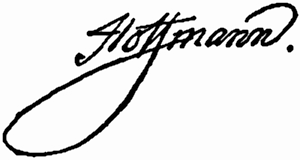Hoffmann’s works in criticism (Hoffmanns Werke in der Kritik)
Fantasiestücke in Callots Manier [‘Fantasy Pieces in the Manner of Callot’ or ‘Fantasias in Callot’s Style’] (1st ed., 4 vol., 1814–1815; 2nd and final ed., 2 vol., 1819)
The boldest fantasy, with risky combinations as only a dream can create them, set in ghostly vitality
- Goethe in support of the polemics of Sir Walter Scott: „They are not the visions of a poetic spirit, they hardly have much apparent content as would at best be granted to infirmities of a monotonous person. They are feverish dreams of a light-hearted sick spirit.“
- Heinrich Heine: „Hoffmann saw ghosts everywhere, they nodded at him from every Chinese teapot and every Berlin wig. He was like a wizard who turned people into beasts and even into royal Prussian court councils. He was able to come out of the grave but life pushed him from himself as a cloudy spook and his works are nothing but an era of fear in 20 volumes.“
- Stefan Zweig: „An unearthly world formed of smoke and dream, fantastic in the figures – this is Hoffmann’s world.“
- Hoffmann’s massive impact on the world of literature
- Mainly in France the first complete edition in 20 volumes is published.
- The great narrators of the 19th century create new themes from Hoffmann’s works.
- The German narrator has a significant influence on Edgar Allan Poe, Fjodor Dostojewskij and Nicolaj Gogol.
- Jacques Offenbach’s opera “Les contes d’Hoffmann“ (The tales of Hoffmann) contributes to the popularity as well as Peter Tschaikowskj’s “Nussknacker-Suite“ (The Nutcracker Suite: https://www.youtube.com/watch?v=M8J8urC_8Jw ).
- In Germany Schumann, Wagner, Busoni, and Hindemith worked on Hoffmann’s themes. However, in the German speaking world a broader readership found its way into Hoffmann´s Oeuvre since the beginning of the 20th century.
- After 1945, the literary criticism began a profound confrontation with Hoffmann’s works: Seghers, Wolf, Schädlich, Kühn, Mensching, Henisch, Schneider, Kirchhoff, Härding and last but not least Wolfschläger.
- Today there are translations of Hoffmann’s work in many languages.
